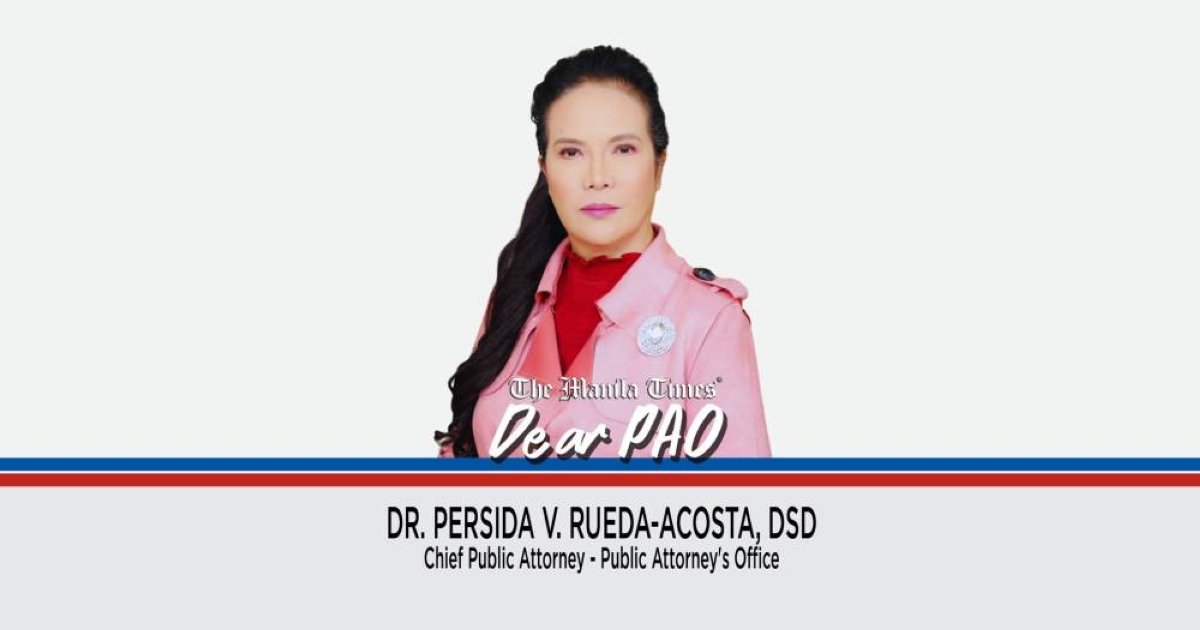Dear PAO,
A case for estafa was filed against my husband. He was acquitted because of the failure of the prosecution to establish his guilt beyond reasonable doubt. However, he was still adjudged to pay the amount being claimed as civil liability. Is the acquittal not tantamount to the dismissal of the case and all other claims?
Fres
Dear Fres,

Please be informed of the Supreme Court’s ruling in the case of Gloria S. Dy v. People of the Philippines, Mandy Commodities Co., GR 189081, Aug. 10, 2016, where the Supreme Court, through Associate Justice Francis Jardeleza, stated the concept of civil liabilities in relation to the filing of criminal charges:
“Our law states that every person criminally liable for a felony is also civilly liable. This civil liability ex delicto may be recovered through a civil action which, under our Rules of Court, is deemed instituted with the criminal action. While they are actions mandatorily fused, they are, in truth, separate actions whose existences are not dependent on each other. Thus, civil liability ex delicto survives an acquittal in a criminal case for failure to prove guilt beyond reasonable doubt. However, the Rules of Court limits this mandatory fusion to a civil action for the recovery of civil liability ex delicto. It, by no means, includes a civil liability arising from a different source of obligation, as in the case of a contract. Where the civil liability is ex contractu, the court hearing the criminal case has no authority to award damages.” (Emphasis and underscoring ours)
From the above-quoted portion of the Supreme Court decision, it is clear that a person who is criminally liable is likewise civilly liable. The civil action is deemed to have been instituted with the criminal action. This is known as a civil liability ex-delicto. However, it does not mean that an acquittal in the criminal action will necessarily obliterate the civil liability, as in this case.
The reason for such separation is that while a single act may produce two liabilities — that is, criminal and civil — they are of a different nature. This is shown by the fact that one requires proof beyond reasonable doubt while the other only requires a preponderance of evidence. One involves a penalty of imprisonment, fine, or both, while the other requires restitution or reparation for damages. The interested party in criminal cases is the State, while the complainant or plaintiff is the interested party in the other. Thus, they may run independently from each other, and the dismissal of one does not necessarily result in the outright dismissal of the other.
Further, the Supreme Court elucidated the instances when a civil liability ex-delicto may survive even after the dismissal of the case, viz.:
“The acquittal of the accused does not automatically preclude a judgment against him on the civil aspect of the case. The extinction of the penal action does not carry with it the extinction of the civil liability where: (a) the acquittal is based on reasonable doubt as only preponderance of evidence is required; (b) the court declares that the liability of the accused is only civil; and (c) the civil liability of the accused does not arise from or is not based upon the crime of which the accused is acquitted. However, the civil action based on delict may be deemed extinguished if mere (sic) is a finding on the final judgment in the criminal action that the act or omission from which the civil liability may arise did not exist or where the accused did not commit the acts or omission imputed to him.” (Emphasis and underscoring ours)
We hope that we were able to answer your queries. Please be reminded that this advice is based solely on the facts you have narrated and our appreciation of the same. Our opinion may vary when other facts are changed or elaborated on.
Editor’s note: Dear PAO is a daily column of the Public Attorney’s Office. Questions for Chief Acosta may be sent to [email protected].










